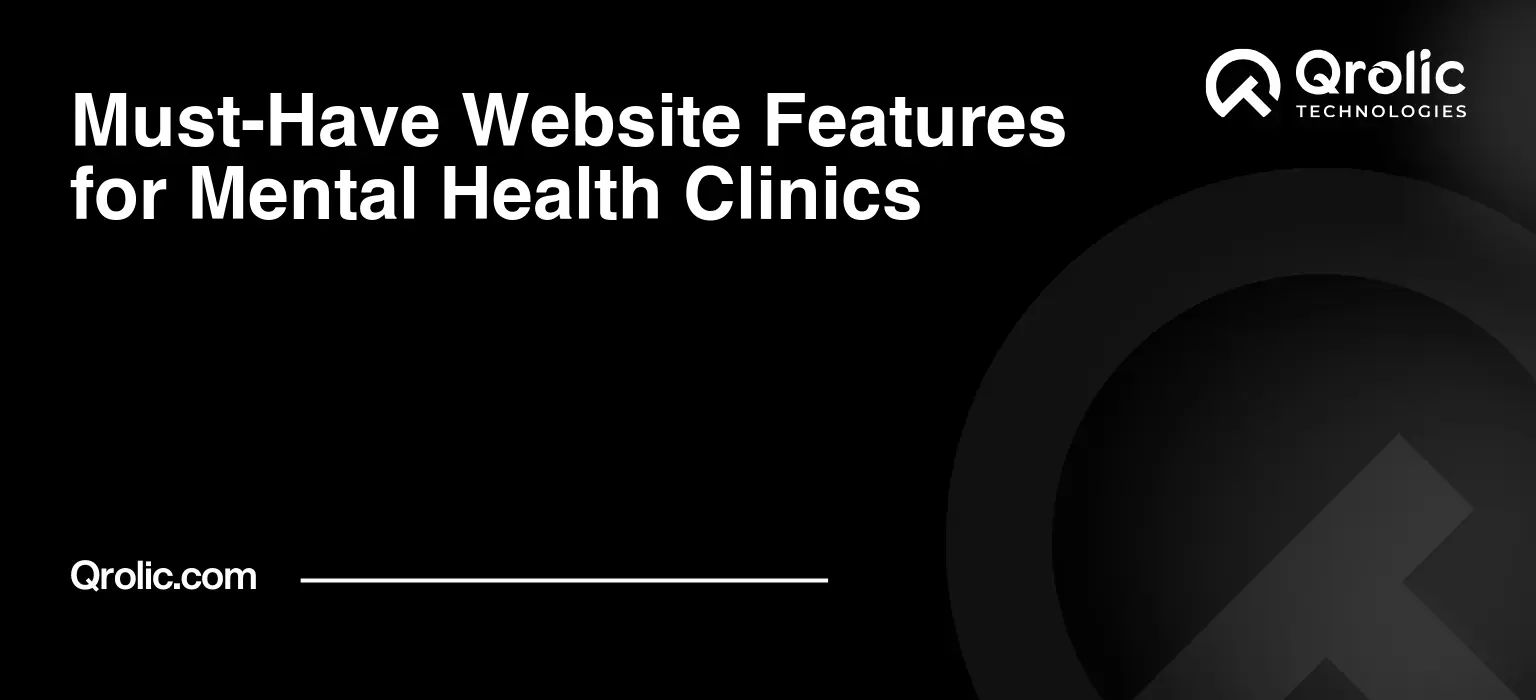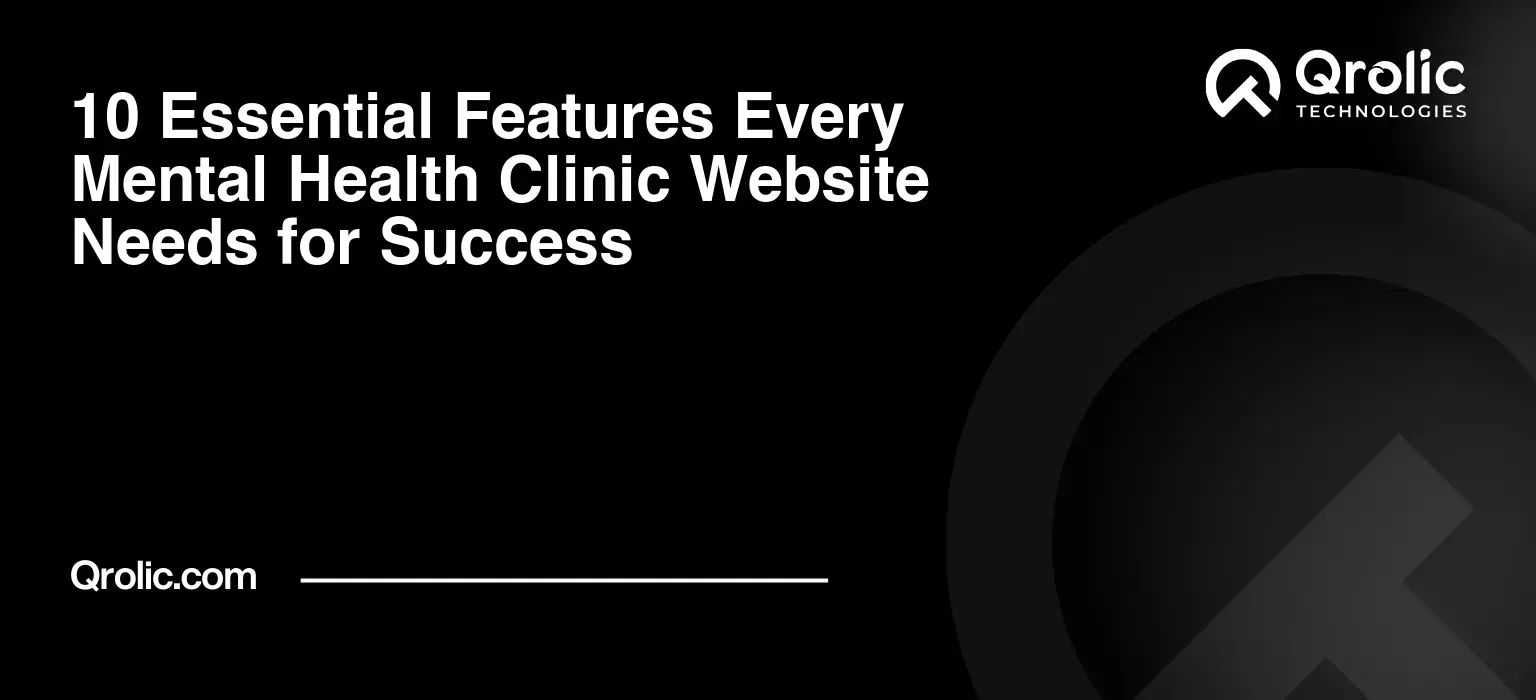Quick Summary:
- Build trust with clear design and empathetic messaging.
- Offer online booking, secure client portals, and therapist profiles.
- Optimize your website for search engines to be found easily.
- Ensure strict HIPAA compliance and ongoing website security.
Table of Contents
- Understanding the Critical Role of a Website for Mental Health Clinics
- Why Your Mental Health Clinic Needs a Robust Website
- Foundational Website Elements: Building a Solid Base
- 1. Clear and Compassionate Messaging
- 2. Professional and User-Friendly Design
- 3. Comprehensive Information Architecture
- 4. Security and Privacy
- Must-Have Features for Enhanced User Experience and Functionality
- 1. Online Appointment Booking: Streamlining Scheduling
- 2. Therapist Profiles: Building Trust and Connection
- 3. Secure Client Portal: Facilitating Communication and Information Sharing
- 4. Blog and Resource Section: Providing Valuable Information and Establishing Expertise
- 5. Teletherapy Integration: Expanding Access to Care
- 6. Testimonials and Success Stories: Building Credibility and Inspiring Hope
- 7. Accessibility Features: Ensuring Inclusivity
- 8. Multilingual Support: Reaching Diverse Communities
- 9. Location Pages (if applicable): Enhancing Local SEO
- 10. Call to Action Buttons: Guiding Visitors Towards Conversion
- SEO Optimization for Mental Health Websites: Getting Found Online
- Keyword Research: Identifying Relevant Search Terms
- On-Page Optimization: Optimizing Your Website Content
- Off-Page Optimization: Building Authority and Credibility
- Technical SEO: Ensuring Website Crawlability and Indexability
- Qrolic Technologies: Your Partner in Building a Thriving Online Presence
- Measuring Success: Tracking Key Metrics
- Key Metrics to Track
- Tools for Tracking Metrics
- Using Data to Improve Your Website
- Staying Compliant: Navigating HIPAA and Ethical Considerations
- Understanding HIPAA Compliance
- Implementing HIPAA-Compliant Practices
- Ethical Considerations
- Future-Proofing Your Website: Staying Ahead of the Curve
- Emerging Trends in Web Design and Technology
- Tips for Future-Proofing Your Website
Understanding the Critical Role of a Website for Mental Health Clinics
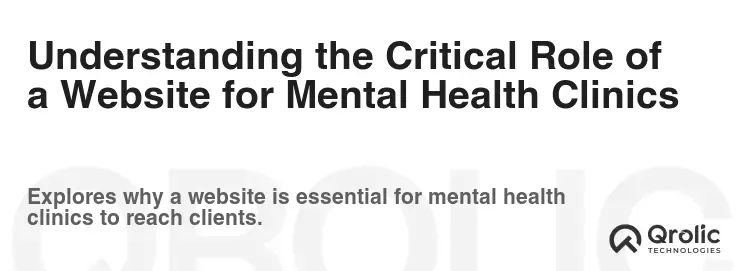
A mental health clinic’s website isn’t just an online brochure; it’s a vital gateway for individuals seeking support, a safe space for exploration, and a crucial tool for building trust and fostering connections. In today’s digital age, it’s often the first interaction potential clients have with your practice. Therefore, having a website that’s not only visually appealing but also functional, informative, and secure is paramount. Let’s explore why a well-designed website is so essential:
Why Your Mental Health Clinic Needs a Robust Website
- First Impressions Matter: Your website is often the first point of contact. A professional and empathetic design can instantly put visitors at ease and encourage them to explore your services.
- Accessibility and Convenience: Individuals can access information about your clinic, services, and team members at any time, from anywhere. This 24/7 availability is crucial for those seeking help outside of regular business hours.
- Reducing Stigma: A well-crafted website can subtly address and reduce the stigma surrounding mental health by providing clear, accurate, and supportive information.
- Building Trust and Credibility: Detailed profiles of therapists, testimonials (with appropriate consent and anonymity), and clear explanations of your approach can establish trust and confidence.
- Streamlining Operations: Online appointment booking, forms, and FAQs can significantly reduce administrative burden and free up staff time to focus on client care.
- Expanding Reach: A website allows you to reach a wider audience, including individuals who may not be aware of your clinic’s physical location or services.
- Showcasing Expertise: Through blog posts, articles, and resource sections, you can demonstrate your expertise and provide valuable information to the community.
- Facilitating Communication: Contact forms, chat features, and dedicated phone lines allow for easy communication and prompt responses to inquiries.
- Improving Client Experience: A user-friendly website can enhance the overall client experience, from initial contact to ongoing support.
Foundational Website Elements: Building a Solid Base

Before diving into advanced features, ensure these foundational elements are in place. These are the basic building blocks of any effective website, especially crucial for a mental health website.
1. Clear and Compassionate Messaging
- Empathy First: Use language that is empathetic, understanding, and avoids jargon. Speak directly to the anxieties and concerns of potential clients.
- Highlight Your Mission: Clearly articulate your clinic’s mission, values, and approach to mental healthcare.
- Focus on Solutions: Emphasize the positive outcomes of therapy and the benefits clients can expect.
- Avoid Stigma: Be mindful of the language you use and avoid perpetuating harmful stereotypes.
2. Professional and User-Friendly Design
- Clean and Uncluttered Layout: A simple, intuitive design helps visitors easily find the information they need.
- Visually Appealing Aesthetics: Use calming colors, professional photography, and a consistent brand identity.
- Mobile Responsiveness: Ensure your website is fully responsive and accessible on all devices (desktops, tablets, and smartphones).
- Fast Loading Speed: Optimize images and code to ensure your website loads quickly, as slow loading times can deter visitors.
3. Comprehensive Information Architecture
- Logical Navigation: Structure your website with a clear and intuitive navigation menu.
- Detailed Service Pages: Each service (e.g., individual therapy, couples counseling, group therapy) should have a dedicated page with detailed information.
- About Us Section: Introduce your team of therapists with individual profiles that include their qualifications, experience, and areas of expertise.
- Contact Information: Prominently display your clinic’s address, phone number, email address, and a contact form.
- FAQ Section: Address common questions about your services, fees, insurance, and policies.
4. Security and Privacy
- SSL Certificate: Install an SSL certificate to encrypt data transmitted between your website and visitors’ browsers, ensuring secure communication.
- Privacy Policy: Clearly state your privacy policy, outlining how you collect, use, and protect client data.
- HIPAA Compliance: Ensure your website and all online communication channels are HIPAA compliant to protect client confidentiality.
- Secure Forms: Use secure forms for collecting sensitive information, such as contact details and intake forms.
Must-Have Features for Enhanced User Experience and Functionality
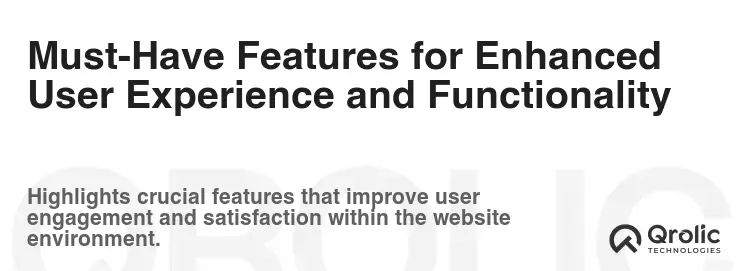
Now, let’s delve into the specific features that will elevate your mental health website and provide a seamless experience for visitors.
1. Online Appointment Booking: Streamlining Scheduling
Why It’s Essential: Online appointment booking provides convenience and flexibility for clients, reduces administrative burden, and improves efficiency.
- Integration with Calendar System: Integrate your website with your existing calendar system (e.g., Google Calendar, Outlook Calendar) to automatically update appointment availability.
- Client Self-Scheduling: Allow clients to view available appointment slots and book their own appointments online.
- Automated Reminders: Send automated email or SMS reminders to clients to reduce no-shows.
- Confirmation Emails: Send confirmation emails with appointment details and instructions.
- Cancellation and Rescheduling Options: Allow clients to easily cancel or reschedule appointments online.
- Mobile-Friendly Booking: Ensure the booking process is seamless and intuitive on mobile devices.
Example: A client can easily select the type of therapy, choose a therapist from a list with their availability, and book a session at their convenience, all within a secure and user-friendly interface.
2. Therapist Profiles: Building Trust and Connection
Why It’s Essential: Detailed therapist profiles help potential clients connect with therapists on a personal level, fostering trust and encouraging them to reach out.
- Professional Headshots: Include high-quality, professional headshots of each therapist.
- Biographies: Provide detailed biographies that highlight their education, experience, areas of expertise, and therapeutic approach.
- Specializations: Clearly list their areas of specialization, such as anxiety, depression, trauma, or relationship issues.
- Therapeutic Approach: Describe their therapeutic approach and how they work with clients.
- Credentials and Licenses: Display their credentials, licenses, and certifications.
- Personal Statements: Include a brief personal statement that allows therapists to share their values and connect with potential clients on a more personal level.
- Video Introductions (Optional): Consider including short video introductions where therapists can speak directly to potential clients.
Example: A therapist’s profile might include their PhD in Clinical Psychology, 10 years of experience working with adolescents, specialization in anxiety disorders, a description of their Cognitive Behavioral Therapy (CBT) approach, and a personal statement about their passion for helping young people overcome challenges.
3. Secure Client Portal: Facilitating Communication and Information Sharing
Why It’s Essential: A secure client portal provides a safe and confidential space for clients to communicate with their therapists, access documents, and manage their appointments.
- Secure Messaging: Allow clients to securely message their therapists with questions, updates, or concerns.
- Document Sharing: Enable therapists to securely share documents with clients, such as intake forms, treatment plans, and progress reports.
- Appointment Management: Allow clients to view and manage their upcoming appointments.
- Billing and Payment: Provide clients with access to their billing information and allow them to make secure online payments.
- HIPAA Compliance: Ensure the client portal is fully HIPAA compliant to protect client confidentiality.
- Two-Factor Authentication: Implement two-factor authentication to enhance security and protect client data.
Example: A client can log into their secure portal to send a message to their therapist about a challenging situation they’re facing, download a copy of their treatment plan, and pay their bill online.
4. Blog and Resource Section: Providing Valuable Information and Establishing Expertise
Why It’s Essential: A blog and resource section allows you to share valuable information, demonstrate your expertise, and attract potential clients through search engines.
- Informative Blog Posts: Publish regular blog posts on topics related to mental health, such as anxiety, depression, stress management, and healthy relationships.
- Expert Advice: Provide expert advice and practical tips that readers can use to improve their mental wellbeing.
- Guest Bloggers: Consider inviting guest bloggers to contribute content and expand your reach.
- Resource Library: Create a library of helpful resources, such as articles, videos, podcasts, and self-help tools.
- Links to External Resources: Provide links to reputable external resources, such as government agencies, non-profit organizations, and mental health associations.
- SEO Optimization: Optimize your blog posts and resource pages for search engines to attract more traffic.
Example: A blog post on “Coping with Anxiety During the Holidays” might offer practical tips for managing stress, setting realistic expectations, and prioritizing self-care.
5. Teletherapy Integration: Expanding Access to Care
Why It’s Essential: Teletherapy integration allows you to offer online therapy sessions, expanding access to care for clients who are unable to attend in-person appointments.
- Secure Video Conferencing Platform: Integrate your website with a secure video conferencing platform that is HIPAA compliant.
- Easy Access to Teletherapy Sessions: Provide clients with easy access to their teletherapy sessions through the client portal or a dedicated link.
- Scheduling and Payment Options: Allow clients to schedule and pay for teletherapy sessions online.
- Technical Support: Provide technical support to clients who are having trouble accessing or using the teletherapy platform.
- Clear Communication: Clearly communicate the benefits and limitations of teletherapy to clients.
- Compliance with Regulations: Ensure your teletherapy services comply with all relevant regulations and guidelines.
Example: A client living in a rural area can connect with their therapist for a teletherapy session from the comfort of their own home, eliminating the need for travel and making therapy more accessible.
6. Testimonials and Success Stories: Building Credibility and Inspiring Hope
Why It’s Essential: Testimonials and success stories provide social proof, build credibility, and inspire hope in potential clients.
- Authentic Testimonials: Feature authentic testimonials from satisfied clients.
- Anonymity and Confidentiality: Protect client privacy by using initials or pseudonyms instead of full names.
- Focus on Outcomes: Highlight the positive outcomes clients have experienced through therapy.
- Video Testimonials (Optional): Consider including video testimonials from clients who are willing to share their stories.
- Success Stories: Share detailed success stories that illustrate how your clinic has helped clients overcome challenges and achieve their goals.
- Ethical Considerations: Obtain informed consent from clients before sharing their testimonials or success stories.
Example: A testimonial from a client might say, “Therapy at [Clinic Name] has been life-changing. I’m finally able to manage my anxiety and live a more fulfilling life.”
7. Accessibility Features: Ensuring Inclusivity
Why It’s Essential: Ensuring website accessibility is crucial for reaching individuals with disabilities and providing equal access to your services.
- WCAG Compliance: Adhere to the Web Content Accessibility Guidelines (WCAG) to ensure your website is accessible to people with disabilities.
- Alternative Text for Images: Provide alternative text for all images to make them accessible to visually impaired users.
- Keyboard Navigation: Ensure your website can be navigated using a keyboard alone.
- Clear and Readable Fonts: Use clear and readable fonts with sufficient contrast.
- Captioning for Videos: Provide captions for all videos to make them accessible to hearing-impaired users.
- Screen Reader Compatibility: Ensure your website is compatible with screen readers.
- Adjustable Font Sizes: Allow users to adjust the font size to their preference.
Example: Using descriptive alt text for images, such as “A therapist and client sitting in a comfortable office, discussing their feelings,” helps visually impaired users understand the image content.
8. Multilingual Support: Reaching Diverse Communities
Why It’s Essential: Offering multilingual support allows you to reach diverse communities and provide services to clients who may not speak English fluently.
- Translation of Website Content: Translate your website content into multiple languages.
- Professional Translation Services: Use professional translation services to ensure accuracy and cultural sensitivity.
- Language Selection Option: Provide a clear and easy-to-use language selection option.
- Support for Right-to-Left Languages: Ensure your website supports right-to-left languages, such as Arabic and Hebrew.
- Culturally Sensitive Content: Adapt your content to be culturally sensitive and relevant to different audiences.
Example: Providing a Spanish version of your website allows you to reach the Hispanic community and provide services to individuals who may prefer to communicate in Spanish.
9. Location Pages (if applicable): Enhancing Local SEO
Why It’s Essential: If your clinic has multiple locations, creating dedicated location pages can improve your local SEO and help potential clients find your nearest office.
- Unique Page for Each Location: Create a unique page for each location with detailed information, such as address, phone number, hours of operation, and directions.
- Embedded Google Map: Embed a Google Map on each location page to help clients easily find your office.
- Local Keywords: Use local keywords in your page titles, headings, and content to improve your search engine ranking for local searches.
- Photos of the Office: Include photos of the office to give potential clients a sense of the environment.
- Therapist Profiles for Each Location: List the therapists who work at each location.
Example: A location page for your clinic’s downtown office might include the address, phone number, hours of operation, a Google Map, photos of the office, and a list of the therapists who work at that location.
10. Call to Action Buttons: Guiding Visitors Towards Conversion
Why It’s Essential: Clear and compelling call to action buttons guide visitors towards taking desired actions, such as booking an appointment or contacting your clinic.
- Prominent Placement: Place call to action buttons in prominent locations throughout your website.
- Action-Oriented Language: Use action-oriented language, such as “Book an Appointment,” “Contact Us,” or “Learn More.”
- Visually Appealing Design: Design your call to action buttons to be visually appealing and stand out from the rest of the page.
- Clear and Concise Messaging: Ensure the messaging on your call to action buttons is clear and concise.
- Track Button Performance: Track the performance of your call to action buttons to see which ones are most effective.
Example: A call to action button on your homepage might say “Schedule Your Free Consultation” and link to your online appointment booking page.
SEO Optimization for Mental Health Websites: Getting Found Online
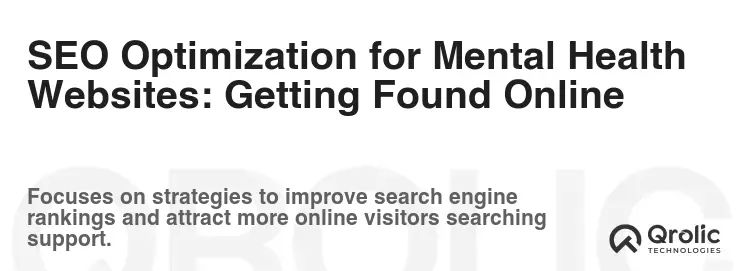
Having a beautiful and functional website is only half the battle. You need to ensure that potential clients can find your website when they search online. This is where SEO (Search Engine Optimization) comes in. Optimizing your mental health website for search engines like Google can significantly increase your visibility and attract more clients.
Keyword Research: Identifying Relevant Search Terms
- Brainstorming: Start by brainstorming a list of keywords related to your services, specialties, and target audience.
- Google Keyword Planner: Use Google Keyword Planner to research the search volume and competition for your target keywords.
- Long-Tail Keywords: Focus on long-tail keywords (longer, more specific phrases) to target niche audiences and improve your chances of ranking.
- Competitor Analysis: Analyze your competitors’ websites to identify the keywords they are targeting.
- Local Keywords: Include local keywords (e.g., “therapist in [city]”) to target potential clients in your area.
Example: Instead of just targeting the keyword “therapy,” you might target long-tail keywords like “therapist for anxiety in [city]” or “online therapy for depression.”
On-Page Optimization: Optimizing Your Website Content
- Title Tags: Optimize your title tags with relevant keywords and your clinic’s name.
- Meta Descriptions: Write compelling meta descriptions that accurately describe your page content and encourage users to click.
- Header Tags: Use header tags (H1, H2, H3, etc.) to structure your content and include relevant keywords.
- Content Optimization: Incorporate your target keywords naturally throughout your website content.
- Image Optimization: Optimize your images with descriptive alt text and compress them to reduce file size.
- Internal Linking: Link to other relevant pages on your website to improve navigation and SEO.
Example: The title tag for your “Anxiety Therapy” page might be “Anxiety Therapy in [City] | [Clinic Name].”
Off-Page Optimization: Building Authority and Credibility
- Link Building: Earn high-quality backlinks from other reputable websites.
- Directory Listings: List your clinic in relevant online directories, such as Yelp and Google My Business.
- Social Media Marketing: Promote your website and content on social media platforms.
- Online Reviews: Encourage satisfied clients to leave positive reviews on Google and other review sites.
- Guest Blogging: Contribute guest blog posts to other relevant websites.
Example: Getting listed in a directory for mental health professionals can provide a valuable backlink to your website and increase your visibility.
Technical SEO: Ensuring Website Crawlability and Indexability
- Website Speed: Optimize your website speed to improve user experience and SEO.
- Mobile-Friendliness: Ensure your website is mobile-friendly and responsive.
- XML Sitemap: Submit an XML sitemap to Google to help them crawl and index your website.
- Robots.txt File: Use a robots.txt file to tell search engines which pages to crawl and which to ignore.
- Canonical Tags: Use canonical tags to prevent duplicate content issues.
- SSL Certificate: Ensure your website has an SSL certificate to provide secure communication.
Example: Compressing images and using a caching plugin can significantly improve your website’s loading speed.
Qrolic Technologies: Your Partner in Building a Thriving Online Presence

At Qrolic Technologies (https://qrolic.com/), we understand the unique needs of mental health clinics and the importance of having a website that is not only visually appealing but also functional, informative, and secure. We offer a comprehensive range of web development and digital marketing services to help you build a thriving online presence and reach more clients.
How Qrolic Technologies Can Help:
- Custom Website Design and Development: We can create a custom website that reflects your brand identity, meets your specific needs, and provides a seamless user experience.
- SEO Optimization: Our SEO experts can optimize your website to rank higher in search engine results and attract more organic traffic.
- Content Marketing: We can create high-quality, engaging content that educates and informs your target audience.
- Social Media Marketing: We can help you build a strong social media presence and connect with potential clients.
- Pay-Per-Click (PPC) Advertising: We can create and manage effective PPC advertising campaigns to drive targeted traffic to your website.
- Website Maintenance and Support: We provide ongoing website maintenance and support to ensure your website is always up-to-date and functioning properly.
- HIPAA Compliance Consulting: We can help you ensure your website and online communication channels are HIPAA compliant.
Why Choose Qrolic Technologies:
- Experience and Expertise: We have extensive experience working with mental health clinics and understand the unique challenges you face.
- Client-Focused Approach: We are committed to providing our clients with personalized service and tailored solutions.
- Results-Driven Strategies: We focus on delivering measurable results that help you achieve your business goals.
- Competitive Pricing: We offer competitive pricing and transparent billing practices.
- Dedicated Support Team: We have a dedicated support team available to answer your questions and provide assistance.
Contact Qrolic Technologies today to learn more about how we can help you build a thriving online presence and reach more clients!
Measuring Success: Tracking Key Metrics

Once your mental health website is live, it’s crucial to track key metrics to measure its effectiveness and identify areas for improvement.
Key Metrics to Track
- Website Traffic: Monitor the number of visitors to your website, including unique visitors, page views, and bounce rate.
- Traffic Sources: Identify where your website traffic is coming from (e.g., organic search, social media, referral links).
- Keyword Rankings: Track your website’s ranking for your target keywords.
- Conversion Rates: Measure the percentage of visitors who take desired actions, such as booking an appointment or contacting your clinic.
- Lead Generation: Track the number of leads generated through your website.
- Client Acquisition Cost: Calculate the cost of acquiring a new client through your website.
- Website Speed: Monitor your website’s loading speed.
- Mobile Usage: Track the percentage of visitors who access your website on mobile devices.
- User Engagement: Measure user engagement metrics, such as time on page, pages per session, and bounce rate.
Tools for Tracking Metrics
- Google Analytics: A free web analytics service that provides detailed data about your website traffic and user behavior.
- Google Search Console: A free tool that helps you monitor your website’s performance in Google search results.
- SEO Ranking Trackers: Tools that track your website’s ranking for your target keywords.
- Heatmap Tools: Tools that visualize user behavior on your website, such as where they click and scroll.
- A/B Testing Tools: Tools that allow you to test different versions of your website to see which performs best.
Using Data to Improve Your Website
- Identify Areas for Improvement: Analyze your data to identify areas where your website is underperforming.
- Optimize Your Content: Optimize your content based on keyword research and user behavior data.
- Improve User Experience: Make changes to your website design and navigation to improve user experience.
- Test Different Strategies: Experiment with different marketing strategies and track the results.
- Stay Up-to-Date: Stay up-to-date with the latest SEO trends and best practices.
By consistently tracking and analyzing your website metrics, you can continuously improve your website’s performance and achieve your business goals.
Staying Compliant: Navigating HIPAA and Ethical Considerations
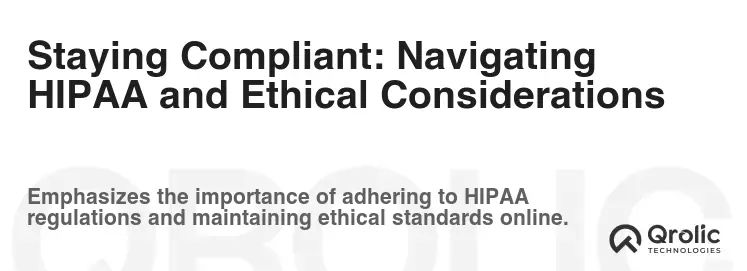
A mental health website handles sensitive information, making HIPAA compliance and ethical considerations paramount. Violating these regulations can result in hefty fines and damage your reputation.
Understanding HIPAA Compliance
- Protected Health Information (PHI): Familiarize yourself with what constitutes PHI under HIPAA.
- Privacy Rule: Understand the Privacy Rule, which protects the privacy of individually identifiable health information.
- Security Rule: Understand the Security Rule, which establishes standards for protecting electronic PHI.
- Breach Notification Rule: Understand the Breach Notification Rule, which requires you to notify individuals and the government in the event of a data breach.
- Business Associate Agreements (BAAs): Ensure you have Business Associate Agreements with any third-party vendors who have access to PHI.
Implementing HIPAA-Compliant Practices
- Secure Website Hosting: Choose a website hosting provider that is HIPAA compliant.
- SSL Encryption: Use SSL encryption to protect data transmitted between your website and visitors’ browsers.
- Secure Forms: Use secure forms for collecting sensitive information, such as contact details and intake forms.
- Secure Email Communication: Use secure email communication channels for sending and receiving PHI.
- Data Encryption: Encrypt PHI at rest and in transit.
- Access Controls: Implement access controls to limit access to PHI to authorized personnel only.
- Regular Security Audits: Conduct regular security audits to identify and address vulnerabilities.
- Employee Training: Train your employees on HIPAA compliance and security best practices.
Ethical Considerations
- Informed Consent: Obtain informed consent from clients before collecting, using, or disclosing their information.
- Confidentiality: Protect client confidentiality and avoid disclosing any information without their consent.
- Accuracy and Honesty: Provide accurate and honest information about your services and qualifications.
- Conflicts of Interest: Avoid conflicts of interest and disclose any potential conflicts to clients.
- Professional Boundaries: Maintain professional boundaries with clients.
- Advertising Standards: Adhere to ethical advertising standards and avoid making misleading claims.
- Online Reviews: Respond to online reviews in a professional and respectful manner.
By prioritizing HIPAA compliance and ethical considerations, you can build trust with your clients and protect their sensitive information.
Future-Proofing Your Website: Staying Ahead of the Curve

The digital landscape is constantly evolving, so it’s essential to future-proof your mental health website to stay ahead of the curve.
Emerging Trends in Web Design and Technology
- Artificial Intelligence (AI): AI-powered chatbots and virtual assistants can provide instant support to website visitors.
- Personalization: Personalized website experiences can improve user engagement and conversion rates.
- Voice Search Optimization: Optimizing your website for voice search can help you attract more traffic.
- Augmented Reality (AR) and Virtual Reality (VR): AR and VR can be used to create immersive and engaging experiences for website visitors.
- Progressive Web Apps (PWAs): PWAs offer a native app-like experience on the web.
- Blockchain Technology: Blockchain can be used to secure client data and protect privacy.
Tips for Future-Proofing Your Website
- Stay Updated: Stay up-to-date with the latest web design and technology trends.
- Invest in a Flexible Platform: Choose a website platform that is scalable and adaptable to future changes.
- Prioritize User Experience: Focus on creating a website that is user-friendly and provides a seamless experience.
- Embrace Mobile-First Design: Design your website with mobile devices in mind.
- Optimize for Speed: Ensure your website loads quickly.
- Invest in Security: Protect your website from cyber threats.
- Continuously Monitor and Improve: Continuously monitor your website’s performance and make improvements as needed.
By embracing new technologies and prioritizing user experience, you can ensure that your website remains relevant and effective for years to come.
By implementing these must-have website features, mental health clinics can create a powerful online presence that attracts new clients, builds trust, and provides valuable resources to the community. Remember to prioritize user experience, security, and ethical considerations to ensure that your website is a valuable asset for your practice.
